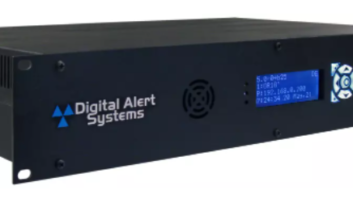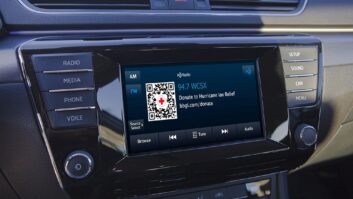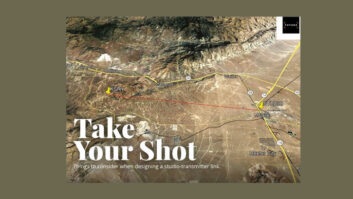ATLANTA — In the first few months at his new job as vice president of technical operations at Cox Media Group, Dave Siegler is beginning to grasp the complexities of overseeing engineering and technical operations for the group owner, which includes 71 FM and 15 AM radio stations, 15 television stations and four metro newspapers.

Dave Siegler Siegler, 54, took over the position at Cox Media Group from Sterling Davis, who retired at the end of 2010. CMG is a subsidiary of Cox Enterprises. The Cox radio and TV technical departments system-wide have approximately 120 field managers, who report to local general managers but will coordinate work projects with Siegler.
He most recently was director of broadcast operations and engineering for the company’s WSOC(TV) and WAXN(TV) in Charlotte. N.C. This is his first job outside of a television station in 23 years.
“The focus of my position will be to grow our integrated media company through times that see the cycle time of new technology shorten almost daily,” he said.
Siegler will be based in Atlanta and reports to Cox Media Group EVP/CFO Dave Johnston.
In addition to overseeing the company’s IT and broadcast engineering infrastructure, part of Siegler’s duties will include coordinating technical initiatives that support its business across media properties, and helping CMG Digital with new initiatives and media products. The group has some 100 digital services and plans more.
Flat cap-ex
“I love the challenge. I plan to focus on visiting the properties, getting to know the facilities, and meeting and greeting the management teams. Discussing capital improvements and so on,” Siegler said.
Capital expenditure levels are flat this year, as they have been for several years — and probably will be for the next few, too, Siegler said.
Siegler said Cox will continue to replace aging equipment as needed in each market this year. Its largest project in 2011 is the consolidation of seven radio stations from two facilities into one new building in Birmingham, Ala.
Cox was an early adopter of HD Radio and has made expanding its HD Radio footprint a priority. The company has HD Radio stations in 15 of its 19 radio markets. It has 46 FM stations licensed for HD, and 19 HD2 channels on the air.
Cox turned off four AM HD signals in 2007 following complaints of self-interference that included an audible hiss to the analog signal, Radio World reported at the time. Those AM HD channels remain off the air, RW reported in fall 2010. Siegler said in April that there has been no talk of AM HD coming back at Cox.

Siegler, the new vice president of technical operations at Cox Media Group, says its radio division has been focused on HD Radio rollout. He stands next to a Ford Edge at the NAB Show that featured an HD Radio receiver displaying Artist Experience, in which audio is synched with images. Photo by Jim Peck However, a large focus for the Cox Radio division has been on the FM HD rollout, according to the engineering executive. “It’s been a selective process for us. We have another three stations going HD this year and plan for more in the coming years.
“We are taking the smart approach because we know it is the chicken-and-egg thing right now. It would be great if there were more radios out there. We know the lion’s share of listening is done in car,” he said.
“Our position is that we must do everything possible to get more HD Radios in dashboards. We have to get in the dash to make this a big winner. Certainly the industry is working on that part of it and I’m optimistic.”
In addition to HD Radio, the transition from analog to digital at all radio facilities is continuing at Cox.
“We are focusing on larger markets. Market size matters when it comes to spending money. We believe the digital conversion involves the complete air chain from audio files through transmission. We’d rather convert one station at a time rather than several of them partial,” Siegler said.
Decentralized purchasing
Much of the radio equipment purchasing at Cox Media Group is decentralized, with local chief engineers at stations given a say in what they purchase.
“We don’t like to do a lot of dictating on equipment management. We do have a preferred vendor list for larger purchases, like consoles, transmitters and routers. We use Harris for the big-ticket items. We have been very happy with (Harris). Cox has a pricing agreement in place with Harris,” he said.
The integration of radio, television and newspaper at CMG will accelerate, Siegler predicts. As an example, he points to Cox’s digital media center in Dayton, Ohio, which came online last December.
In the center, the group manages news content for a TV station, three radio stations, several daily newspapers and a spate of weekly newspapers across the region. In addition, the center handles Cox’s printing and mail services for the region.
“We have seen synergies and a lot of gains in Dayton where we have combined the assignment desk, editorial and news room functions into the [Cox Media Group] model. There is a lot of work flow improvement. We will be looking to do it in other markets where we have at least two of the platforms.”
The evolving structure of how radio works in unsettled economic times will force him to take a close look at the company’s technical workforce, Siegler said. He anticipates the further hybridization of engineering staff at Cox.
“The skill sets needed are becoming IT-centric even further. We are looking at how we can better train and better deploy staff with skill sets in multiple disciplines. Job duties have evolved over the past few years and they will continue to evolve. It’s not just about managing head count, but instead it’s about making the best use of resources and diversifying skills.

‘I plan to focus on visiting the properties, getting to know the facilities, and meeting and greeting the management teams.’ Photo by Jim Peck “The best hiring candidates we see these days have a mix of studio, RF and IT experience. The days of having specialists in each of these areas are fading fast. We know it’s hard to teach an IT person radio, and likewise it’s hard to train a radio person IT. We need blending of these skills.
“What we really want to [do is] zero in on staff development and retain the best talent and promote the best in our group. We have to pay attention to it because the talent pool for traditional broadcast engineering is shrinking.”
Siegler points to a change in the way many Cox radio stations now execute remotes as an example of how fast technology is evolving. Cox stations are using 3G, 4G and Wi-Fi now for remotes more than the Marti and van.
“We are leaping forward in big strides. The cycles are changing fast and faster and shortening. To remain competitive we have to keep up.”
The question he raises is where radio fits into all of the new consumer electronic technology.
“There are a ton of new devices from tablets to iPads. It’s important that radio play a part of the adoption process. That said, the majority of radio listening will always be done in the car.”
Siegler, born and raised in Jacksonville, Fla., was an electronics tinkerer as a kid. He did a short stint as what he described as a “technical jock” at an AM station in Jacksonville one summer while in high school.
“I helped with technical operations and engineering and soon realized I’m better off not on mic,” he said.
Siegler began his full-time technical career in 1991 at PGA Tour Productions as a maintenance engineer before joining WJXT(TV) in Jacksonville, also as a maintenance engineer. TV broadcast engineering stops along the way have included stations in Miami, Detroit, Atlanta and Charlotte, N.C.
In taking over from Sterling Davis, Siegler said, “They are definitely big shoes, or boots to fill. He has positioned our engineering group well for the future and I’m humbled to carry that forward.
“My view is to look ahead and not back as we face many challenges both in the industry and as a media business. While his and my personalities are very similar, I take a fresh approach at these challenges.”
Siegler and his wife, Sally, are looking for a home in the Atlanta area. The couple has one grown son.












